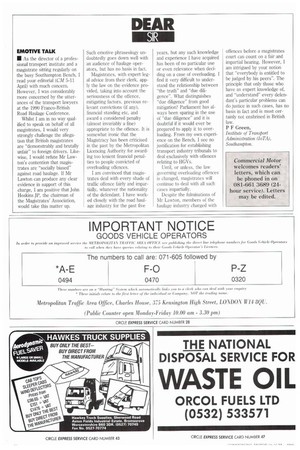DEAR
Page 86

If you've noticed an error in this article please click here to report it so we can fix it.
SIR
• As the director of a professional transport institute and a magistrate sitting regularly on the busy Southampton Bench, I read your editorial (CM 5-11 April) with much concern. However, I was considerably more concerned by the utterances of the transport lawyers at the 1990 Franco-British Road Haulage Conference.
Whilst I am in no way qualified to speak on behalf of all magistrates, I would very strongly challenge the allegation that British magistrates are "demonstrably and brutally unfair" to foreign drivers. Likewise, I would refute Mr Lawton's contention that magistrates are "socially biased" against road haulage. If Mr Lawton can produce any clear evidence in support of this charge, I am positive that John Hoskins JP, the chairman of the Magistrates' Association, would take this matter up.
Such emotive phraseology undoubtedly goes down well with an audience of haulage operators, but has no basis in fact.
Magistrates, with expert legal advice from their clerk, apply the law on the evidence provided, taking into account the seriousness of the offence, mitigating factors, previous relevant convictions (if any), financial standing etc, and award a considered penalty (almost invariably a fine) appropriate to the offence. It is somewhat ironic that the Magistracy has been criticised in the past by the Metropolitan Licencing Authority for awarding too lenient financial penalties to people convicted of overloading offences.
I am convinced that magistrates deal with every shade of traffic offence fairly and impartially, whatever the nationality of the defendant. I have worked closely with the road haulage industry for the past five years, but any such knowledge and experience I have acquired has been of no particular use or even relevance when deciding on a case of overloading. I find it very difficult to understand the relationship between "the truth" and "due diligence". What distinguishes "due diligence" from good mitigation? Parliament has always been sparing in the use of "due diligence" and it is doubtful if it would ever be prepared to apply it to overloading. From my own experience on the Bench, I see no justification for establishing transport industry tribunals to deal exclusively with offences relating to HGVs.
Until, or unless, the law governing overloading offences is changed, magistrates will continue to deal with all such cases impartially.
Despite the fulminations of Mr Lawton, members of the haulage industry charged with offences before a magistrates court can count on a fair and impartial hearing. However. I am intrigued by your notion that "everybody is entitled to be judged by his peers". The principle that only those who have an expert knowledge of, and "understand" every defendant's particular problems can do justice in such cases, has no basis in fact and is most certainly not enshrined in British law.
P F Green, Institute of Transport Administration (IoTA), Southampton.
























































































































